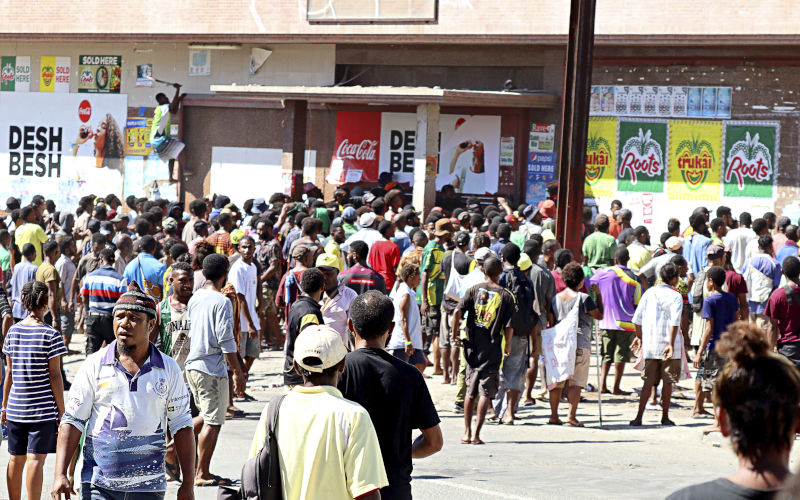The January riots in Papua New Guinea
January 24, 2024
On 10 January, Port Moresby was rocked by riots, looting and arson on an unprecedented scale. Rioting also occurred in Lae and several other towns. More than twenty people died and there has been extensive damage to property.
During the course of 2023, Papua New Guinea signed security agreements with Australia and the US and conducted security-related discussions with China, Britain, the EU, France, India, Indonesia and Israel. But this international engagement was generally seen within Papua New Guinea as having little impact on the lives of Papua New Guineans and often serving the interests of international partners rather than those of Papua New Guinea. The enhanced Defence Cooperation Agreement (DCA) with the US, in particular, was not universally welcomed in Papua New Guinea. Prime Minister Marape himself was quick to reassure the electorate that PNG will not be a military launching pad and later expressed a wish for the US to focus on trade and development with Papua New Guinea instead of focussing only on security and politics. The parliamentary opposition leader, Joseph Lelang, even applied for a Supreme Court interpretation on the constitutionality of the DCA.
As Marape, and others, have continued to emphasise, Papua New Guineas principal challenge is internal security. 2023 saw escalating levels of Inter-group (tribal) fighting, involving the use of high-powered weapons, drones, social media and the use of mercenaries, in parts of the highlands, with a three-month curfew imposed in Enga Province and joint security force operations in Enga, Hela and Southern Highlands provinces. Beyond the highlands, Inter-group fighting, criminal gang activities, sorcery-accusation-related violence (SARV) and domestic violence also impacted on communities in provinces where law and order problems have been less salient. In October the chairman of the Permanent Parliamentary Committee on Law and Order said, the countrys law and order situation is at its most critical point and will collapse if nothing is done to address the issue. The priority of internal over external security was, at Papua New Guineas insistence, incorporated in the PNG-Australia Framework for Closer Security Relations signed in December 2023.
Notwithstanding this, the riots which erupted on Port Moresby in January have shocked many Papua New Guineans and observers outside the country.
The rioting, looting and arson of 10 January were triggered by what the government has described as a technical glitch in the payroll system, following changes in the tax system (specifically a change in the tax-free threshold), which resulted in public servants receiving payments in early January of amounts less than they expected, impacting particularly on public servants at the lowest end of the income scale. Amongst others, police abandoned their posts to attend protest rallies at the national parliament and opportunists were quick to descend on supermarkets, stores, warehouses and homes, looting and setting fire to buildings and vehicles. Rioting subsequently spread to Lae and some regional centres. In the chaos, twenty-two people were killed mostly apparently shot by store owners defending their property or trapped in burning buildings while looting and damage has been estimated at around $A160 million. Many of those who lost their properties and stock are ethnic Chinese, ethnic Indians or Papua New Guineans. The Chinese government promptly made stern representations to its Papua New Guinean counterpart, demanding that the government guarantee the safety of its citizens, take steps to protect their businesses, and severely punish those responsible for smashing, looting and burning though it appears not to have followed up on earlier initiatives to support the Royal Papua New Guinea Constabulary.
Prime Minister Marape declared a 14-day state of emergency and 1000 Defence Force personnel were reportedly deployed to assist police. The police commissioner and Finance officials were suspended. Apparently no request was made for Australian assistance in dealing with the situation. An uneasy calm was quickly restored (when the shops have been emptied and large areas burned out, what is there left to do?) but the short-term and longer-term effects of the theft and destruction will be significant.
In seeking explanations of the outburst of violence it is hard to go beyond the obvious: the volatility of communities with high numbers of mostly-male immigrants many of whom are on low incomes or unemployed, whose identification with the state is weak and who are quick to react to perceived injustices and to seize opportunities for gain, propelled by a sense that political and administrative leaders exploit state resources and opportunities for their personal benefit.
Following the riots, rumours began circulating that (unnamed) politicians had encouraged the escalation of violence. As of 9 February, when his post-election grace period expires, Prime Minister Marape will be vulnerable to a vote of no confidence; the National Parliament is scheduled to reconvene on 29 February. In the days after the riots six members of the Marape government resigned and one was dropped, and Marape reshuffled his cabinet.
Marape has come under criticism but still seems to have substantial support, and so far no likely alternative prime minister has emerged, though former prime minister Peter ONeill seems to be keen to return to the position. It is hard to believe that Papua New Guineas MPs would re-elect ONeill to the prime ministership, given his past record, but nothing is impossible in Papua New Guinea politics. The next few weeks will be worth watching.
